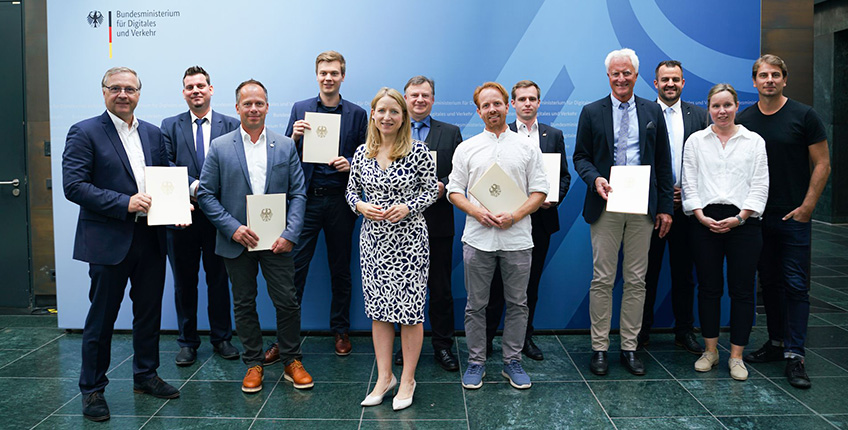Funding notifications totalling close to 9 million euros handed over.
As part of its “BordstromTech” (“Onboard PowerTech”) funding guideline, the Federal Ministry for Digital and Transport (BMDV – Bundesministerium für Digitales und Verkehr) is providing support for a total of 21 projects to reduce ship emissions in seaports and inland ports. The notifications of funding amounting to almost 9 million euros were ceremoniously handed over by Parliamentary State Secretary Daniela Kluckert on 27 June 2023 at a workshop on technologies for environmentally friendly on-board power and mobile shore-side power supply for seagoing and inland vessels at the BMDV.
In order to reduce the use of conventional diesel generators on board of seagoing and inland waterway vessels while in port, a whole range of technology options are available. Therefore, the bandwidth of the technology deployed in the funded projects is very diverse: Besides the procurement of mobile shore-side power systems, ship upgrades for the use of shore-side power as well as alternative technologies for on-board power generation are being funded. The market for these technologies is being boosted and a significant reduction in air pollutants is being achieved in German sea and inland ports. It is anticipated that up to 11,900 t of greenhouse gas emissions and up to 205 t of air pollutant emissions will be reduced annually in the ports as a result of the 21 funded projects.
Daniela Kluckert, Parliamentary State Secretary to the Federal Minister for Digital and Transport: “In order to reduce ship emissions in the maritime sector that are harmful to the environment and health, we need a variety of solutions. The technology-open approach of the BMDV’s ‘BordstromTech” funding programme is therefore in exactly the right place by providing targeted support for promising future technologies for on-board power supply and the use of shore-side power. With this approach, we are strengthening our maritime industry, making an important contribution to climate protection and simltaneously securing new opportunities for ourselves in the market economy.”
Overview of the funded projects:
Mobile shore-side power supply in Bremerhaven and Norddeich
The project in Bremerhaven, which has already been completed by the company Stahlbau Nord, supplies power to ships moored at the pier via two mobile shore-side power containers. This eliminates the need for on-board diesel generators while the ship is berthed. Depending on the energy requirements, the two mobile shore-side power containers can supply one large ship together or two smaller ships in parallel with the necessary on-board power. The company received around 1.6 million euros in funding for this project.
The Norden-Frisia shipping company received funding support of just under 650,000 euros to contribute to the investment in a floating charging pontoon for the shore-side power supply of the all-electric island ferry, which is currently being procured. The goal: emission-free island transport to Norderney from Norden-Norddeich.
H2 power unit for Cuxhaven and the Schleswig-Holstein tidal flats
The company Offshore-Service from Cuxhaven is being supported with around 1.8 million euros to equip the offshore supply vessel “Coastal Liberty” with an H2 power unit. With the help of the H2 power unit, hydrogen will be converted into electricity by means of a fuel cell system and the ship will be able to operate in the harbour and the Schleswig-Holstein tidal flats largely without the previous diesel-powered propulsion system – the first application of a fuel cell propulsion system based on hydrogen in German coastal shipping.
Shore-side power upgrades for ships docked in German seaports
The shipping companies Finnlines and TT-Line will use the support from the funding programme to upgrade several of their ferries to accept shore-side power. The RoPax vessels Finnlady, Finnmaid and Finnstar (from Finnlines) as well as MS Nils Holgersson, MS Peter Pan, MS Akka and MS Tinker Bell (from TT-Line) will be supplied with shore-side power during their port berths after the conversion. The German seaports of Lübeck/Travemünde and Rostock will soon be able to benefit from the shore-side power upgrades and the emission savings from the use of shore-side power. The total amount of funding for Finnlines is around 770,000 euros, that for TT-Line amounts to just under 2.3 million euros.
The “AIDAnova” cruise ship is also being supported with just under 900,000 euros for upgrading to shore-side power. This will significantly reduce emissions during port calls, for example in Hamburg or Kiel.
Electric mobility in Berlin’s leisure shipping sector
A total of seven houseboats powered by PV systems and batteries are being procured in Berlin from Deutsche Handelsgesellschaft für Technologie und Service Riedel with the help of funding amounting to almost 220,000 euros. In addition to the on-board PV systems, the houseboats will be powered by three floating charging infrastructure islands, which will also receive funding of just under 700,000 euros and will also be available to external boats for charging in the future. Innovations in the field of emission-free technologies on the water will therefore once again be visible in the German capital.
Image source: BMDV, Vichy Ly


